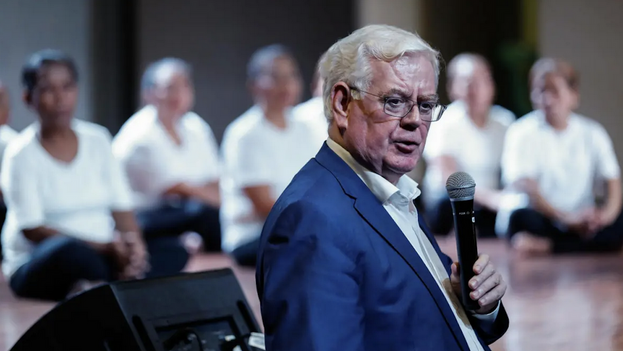
![]() 14ymedio, Yoani Sánchez, Generation Y, Havana, 20 November 2023 — This week, the visit of the special representative of the European Union (EU) for Human Rights, Eamon Gilmore, is expected in Cuba. The national context in which the official arrives could not be more adverse. In the midst of the most significant mass exodus in recent decades, with more than a thousand political prisoners and a deep economic crisis, the Island will give Josep Borrell’s envoy multiple headaches. The biggest challenge of his trip will be to avoid the daunting agenda that the Havana regime is preparing for him to prevent him from looking towards the most problematic and painful areas of Cuban reality.
14ymedio, Yoani Sánchez, Generation Y, Havana, 20 November 2023 — This week, the visit of the special representative of the European Union (EU) for Human Rights, Eamon Gilmore, is expected in Cuba. The national context in which the official arrives could not be more adverse. In the midst of the most significant mass exodus in recent decades, with more than a thousand political prisoners and a deep economic crisis, the Island will give Josep Borrell’s envoy multiple headaches. The biggest challenge of his trip will be to avoid the daunting agenda that the Havana regime is preparing for him to prevent him from looking towards the most problematic and painful areas of Cuban reality.
Unlike other times, when information trickled out of the country, Gilmore has had at his disposal countless reports, testimonies and articles from the independent press that detail the magnitude of the repression we suffered. He has also been able to meet with exiles who have told him, first-hand, about the forced banishment, the travel ban that weighs on several dissidents, the threats against the families of those convicted of the popular protests of 11 July 2021, and the twist of censorship represented by the new Social Communication Law, already approved and which will soon come into force.
However, it is one thing to read all those alarming reports and listen to the stories of emigrants, and another, very different, to hear the voices of the victims within Cuba and include in the program contact with the most silenced and vulnerable part of our society. On the Island, Gilmore will be another guest at the Plaza de la Revolución and will have to adhere to official protocol, which translates into the need to condemn the US embargo, praise public services — even if they only take him to schools and hospitals carefully ‘made up’ for the occasion — and to proclaim the “solid ties” of collaboration between the European Union and Havana.
Someone who protects Human Rights should go further, escape from the symbolic gestures and red carpets to delve into what ails and frightens a society
But someone who protects Human Rights should go further, escape from the symbolic gestures and red carpets to delve into what ails and frightens a society. If he follows a program in line with his position, Gilmore would not be able to avoid visiting at least one Cuban prison. Immersing himself in this underworld is vital to understanding the total absence of physical and legal guarantees that afflicts the prisoners. Speaking directly with political prisoners and their families would be vital to understanding what is happening on this island.
If the official also used the internet connection offered by the state telecommunications monopoly, Etecsa, during his stay, he could see for himself the dozens of blocked digital sites, especially those that offer national news without complying with the editorial guidelines of the Communist Party. A walk through the Cuban fields, not to the farms decorated for the eyes of international organizations, but to those of farmers who cannot even buy wire for their fences because agricultural inputs are sold only in foreign currency, would add nuances to his conclusions.
His could not miss on his trip the crowded airport hall where hundreds of men, most of them young and with light luggage, are preparing to board a plane to Managua to begin the migratory route. The failure of the model imposed more than six decades ago is summarized in those Cubans who leave seeking economic improvements and freedoms.
To the list of actions, Gilmore could add the surprise arrival at a ration market with its many flies and few products, in addition to the emergence of one of those businesses, which have appeared everywhere, where the price for thirty eggs is equivalent to one monthly salary. To top it off, a walk through a neighborhood on the outskirts of Havana is recommended, full of people “illegal” in their own country, lacking drinking water service and opportunities.
All this and more would give the special representative of the European Union for Human Rights a complete and realistic vision of what we Cubans are experiencing. But between the traps of the official agenda and the timorous European diplomacy, it is possible to foresee that Gilmore’s visit will remain just one more, without ramifications for our citizens. After all, he is only in office for a brief period and the Cuban regime surpasses him with its 64 years of repressive experience.
________________________
Editor’s Note: This text was originally published in Deutsche Welle in Spanish.
____________
COLLABORATE WITH OUR WORK: The 14ymedio team is committed to practicing serious journalism that reflects Cuba’s reality in all its depth. Thank you for joining us on this long journey. We invite you to continue supporting us by becoming a member of 14ymedio now. Together we can continue transforming journalism in Cuba.
